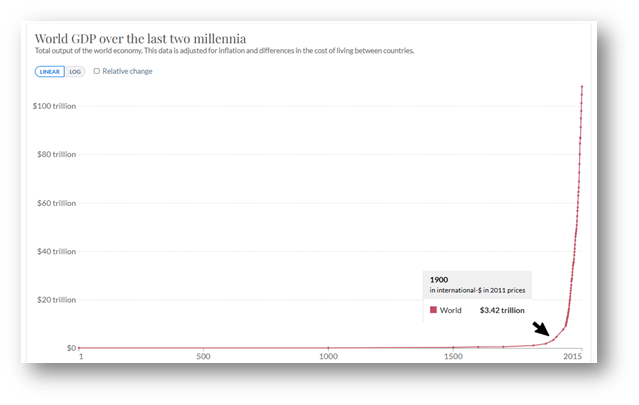Captalism Is Inherently Futuristic, But...
What happens if people are pessimistic about the future?
Capitalism is an economic system based on the private ownership of the means of production and the production of goods and services for profit. The goal of capitalism is the accumulation of capital, which is used to invest in new businesses and technologies. Investment is, by definition, a bet on the future, and this is what makes capitalism intrinsically futuristic.
It’s hard to overstate how important an optimistic future outlook is for capitalism. The capitalistic ideas of growth, accumulation, and investment all assume that tomorrow will be different, and probably better, than today. Growth means that the economy will produce more goods and services, which will lead to higher standards of living for everyone. Accumulation means that people will save their money so they might invest it in new businesses, which will create jobs and generate economic growth. Investment means that people will put their accumulated capital into new opportunities and technologies, which will lead to innovation and productivity gains. And all of these ideas are based on the belief that the future will be better than the past.
Here are some additional thoughts on why capitalism is intrinsically futuristic:
- Capitalism is based on the idea of competition. In order to succeed, businesses need to be constantly innovating and finding new ways to serve their customers. This leads to a constant drive for progress and improvement.
- Capitalism is also based on the idea of individual opportunity. Anyone with a good idea and the drive to succeed can start their own business and make a fortune. This creates a sense of hope and optimism about the future. Finally,
- Capitalism is based on the idea of global markets. This means that businesses are not limited to their local markets. They can sell their products and services to people all over the world. This creates a sense of excitement and possibility about the future.
For the most part, capitalism has kept this promise very well. A majority of historians identify the late 1700s as the starting point for the industrial revolution in England. The revolution spread to neighboring European countries and to the U.S. in the early to middle 1800s. The impact of industrialization is powerfully illustrated in the chart below. World GDP growth,as estimated by OurWorldInData.org, was essentially flat until the late 1800s, and then with the proliferation of industrialization and capitalism, grew remarkably ever since.

But what happens when individuals lose their optimism for and faith in the future and that the economy will be weaker? What happens when Americans are pessimistic about the future of the country, that the U.S. will be less important in the world, and there will be more political division and income inequality?
A recent survey by Pew Research found that Americans take a very dim view of the nation’s future and look more positively at the past. The key findings of the Pew Research Center survey are:
- A majority of Americans (60%) have a negative view of the nation’s future. This is up from 53% in 2021.
- Only 30% of Americans have a positive view of the nation’s future.
- A majority of Americans (58%) believe that life in America is worse today than it was 50 years ago.
- Only 23% of Americans believe that life today is better, and 19% say it is about the same. Most importantly,
- Younger Americans are more likely than older Americans to have a negative view of the nation’s future.
Other major polling companies found the same results. Now, it is very important to note that polls and surveys are just snapshots of a particular moment in time. It is possible and even likely Americans will become more optimistic in the future. Cycles come and cycles go. Still, without the belief in a better future, there would be no incentive to invest, grow, and accumulate. Of course, there is no guarantee that the future will be better than the past. And, capitalism is a risky system, and there is always the possibility of economic downturns and crises. Still, the history of capitalism has shown that it is a resilient system that has always managed to recover from setbacks and emerge stronger than before.